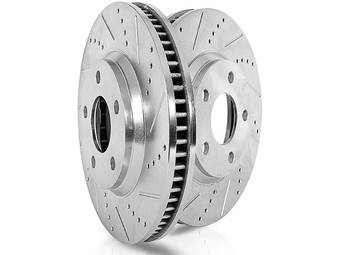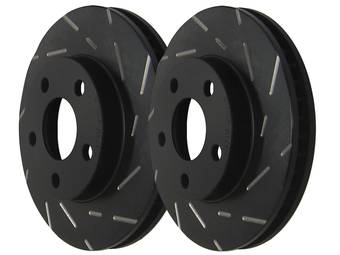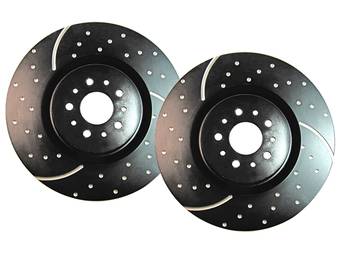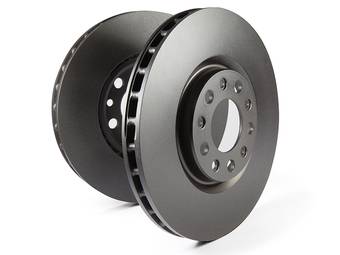Free Shipping on Orders Over $100
2010 Hyundai Tucson Brake Rotors
What Are Brake Rotors?
Your vehicle’s brakes are an essential safety system, and the rotors are a critical component of said system. Brake rotors are large metallic (typically gray iron) disks attached to your vehicle’s hubs. Every time your wheels rotate, the brake rotor rotates alongside them. As you press the brake pedal, the rotors provide a contact surface for the brake calipers and pads to cinch onto, thus creating the friction necessary to bring your vehicle to a stop.
How Long do Brake Rotors Last?
The longevity of your brake rotors depends entirely on your driving style and brake pad compound. If you regularly ride the brakes, commute in stop-go traffic, or frequent mountainous areas, the rotors may incur wear far quicker than another driver who primarily drives at low speeds around town or commutes on open highways.
Certain brake pad compounds, like semi-metallic, are highly abrasive. While they stop well, they can cause significantly more rotor wear than a comparable ceramic or organic pad. No need to worry. Each brake system features a brake wear warning noise that alerts you to inspect your brake pads and see which brake parts need to be replaced.
When To Replace Brake Rotors
With such variations in rotor lifespans, assessing when your rotors require replacement can be challenging. However, several characteristics can indicate excessive rotor wear, including:
Warping
If your brakes get excessively hot, or if you slam on the brakes with a heavy load in the bed or trailer on the hitch, the rotors may warp. Once warped, rotors typically require a replacement. Symptoms of warped rotors include intermittent squeaking as the pads pass over high and low spots and pulsing in the brake pedal with the brakes applied.
Grinding
If you notice a metallic grinding noise when applying the brakes, there’s a good chance you’ve worn through the friction material of your brake pads, resulting in metal-on-metal contact. If this is the case, your brake rotors are likely gouged and require a replacement—at a minimum, they’ll require resurfacing.
Visible Grooving
While slightly visible grooves around a rotor aren’t abnormal, deep grooves that catch on a fingernail are. If significant grooving is present on your rotors, it indicates that they’re at the end of their lifespan.
Benefits of Replacing Rotors
Replacing rotors each time you replace your brake pads is a good practice, allowing for a proper pad break-in, even pad wear, and reduced noise. Especially if you run oversized wheels and tires or you’re rough on your vehicle’s braking system (regularly towing heavy, racing, commuting through hilly terrain), we recommend replacing your vehicle’s rotors during routine brake services.
Brake Rotor Types
Brake rotors come in several patterns and finishes, but how do they differ performance-wise?
Blank
Blank or OE-style (Original Equipment) brake rotors are available with a traditional smooth rotor surface. Generally, they offer the same amount of performance and braking power as the vehicle’s original brake rotors.
RealTruck Expert Pick: EBC Premium OE Brake Rotors
Why we love them:
Constructed of premium G3000 gray iron castings
Black Geomet coating for excellent durability and great looks
Built to be an exact match for the original parts
All EBC brake rotors are individually inspected
Precision machined and balanced
Cross-ground or diamond-tuned brake zone finish
10,000 mile | 6-month warranty
Slotted
The slots on the surface of the rotor allow for dust and dirt evacuation while driving. Clearing the rotor face of debris allows for consistent contact between the rotor and brake pad, which means greater stopping power. This design is ideal for vehicles that frequently haul or tow heavy payloads.
RealTruck Expert Pick: EBC Ultimax Slotted Brake Rotors
Why we love them:
Constructed of premium G3000 gray iron castings
Black Geomet coating for excellent durability and great looks
Operate up to 200 degrees cooler, preventing brake fade during high performance
Narrow slots cool rotors while also reducing wind noise
Slots remove dirt, dust, and debris to maintain consistent contact between the pad and the rotor
All EBC brake rotors are individually inspected
10,000 mile | 6-month warranty
Dimpled & Slotted
Dimpled and slotted rotors offer all the benefits of drilled and slotted rotors. However, they're just as structurally sound as OE rotors. Dimples are small holes in the rotor face that do not go all the way through but still offer the benefits of holes. Dimpled and slotted rotors deliver maximum performance coupled with excellent durability.
RealTruck Expert Pick: EBC Sport Dimpled and Slotted Brake Rotors
Why we love them:
Constructed of premium G3000 gray iron castings
Black Geomet coating for excellent durability and great looks
Wide slots help to keep brakes up to 200 degrees cooler, reducing brake fade at higher speed
Slots remove dirt, dust, and debris to maintain consistent contact between the pad and the rotor
Drilled dimples allow for pad degassing without drilling through the rort, which can lead to stress cracks
All EBC brake rotors are individually inspected
10,000 mile | 6-month warranty
Drilled and Slotted
This design combines the benefits of drilled holes and carved slots. Power Stop carries an extensive line of drilled and slotted rotors for cars, trucks, vans, and SUVs. These rotors improve braking at high speed—however, the edges of this rotor type can wear brake pads faster than smooth rotors.
RealTruck Expert Pick: Power Stop Drilled and Slotted Rotors
Why we love them:
Constructed of G3000 grade castings from premier foundries
Silver zinc plated to resist corrosion and rust
Drill holes are designed to keep brake rotors up to 180 degrees cooler
Slots are designed to clear rotors of dust and gas for consistent pad contact
Increase brake performance
Add an undeniably good look to custom or stock wheels
3-year | 36,000-mile warranty
Drilled
Drilled rotors offer greater performance than factory equipment. Holes in the rotor allow brake pads to degas during use, reducing fade and maintaining consistent stopping power. Drilled rotors also create a high-performance look that is sought after by many automotive enthusiasts. However, they are less than ideal for large vehicles that do a lot of towing and hauling due to the possibility of stress fractures.






